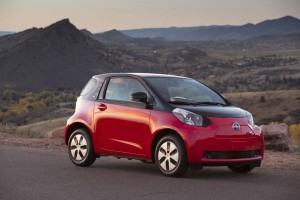Toyota is adding a second battery-electric vehicle to its U.S. line-up, a lithium-ion-powered version of its Scion iQ microcar. But plans for the new green machine underscore the Japanese giant’s continued skepticism about the near to mid-term potential of battery-electric propulsion.
As with the Toyota RAV4-EV introduced earlier this year, the Scion iQ will be produced in relatively low numbers – and it will be targeted at campus and urban car-sharing programs rather than being sold directly to consumers, the maker reveals.
Just 90 of the electric microcars will be delivered to the U.S. initially. Toyota plans to reveal further details of who will get the iQ, and where, in the coming weeks.
“Toyota believes battery-electric vehicles have the potential to play a role in future mobility strategies,” says Chris Hostetter, TMS group vice president of strategic planning. “Up to now, cost and convenience issues have limited BEV’s appeal with a broad consumer market. Toyota developed the iQ EV specifically as a city commuter, for use in an urban environment, where driving distances are likely to be short, charging opportunities numerous, and its compact proportions beneficial.”
The Toyota iQ EV is virtually identical in appearance to the gas-powered version of the four-seat microcar – the second-smallest vehicle sold by a major manufacturer in the U.S. after the Smart fortwo. A 12 kilowatt-hour lithium-ion battery provides a range estimated at up to 50 miles per charge and the vehicle can be fully recharged in as little as three hours using a 240-volt circuit.
With a 78-inch wheelbase and a 13.5-foot turning radius, Toyota suggest the “highly maneuverable” iQ EV is well-suited for use “in congested areas where streets are narrow and parking is at a premium.”
Toyota has long been openly skeptical of lithium technology and the advanced vehicles it can be used in, such as plug-in hybrids and pure battery-electric vehicles, or BEVs – preferring to focus on older-style nickel-metal hydride batteries used in the maker’s more conventional hybrids, such as the Toyota Prius. But facing tough competition – and legislative pressure from California and other states – it has begun adding lithium-based models such as the RAV4-EV and the new Prius Plug-In.
Though Toyota plans to sell just a few thousand of the electric RAV crossovers during the next three years it has seen a surge of orders for the extended-range Prius model, now the second best-selling entry in the so-called “advanced” battery-vehicle market, just behind the Chevrolet Volt.
Nonetheless, Toyota is still playing it cool, especially on pure battery power. And considering the slow ramp-up in the overall market, many analysts believe its skepticism is justified. Slow demand was a major factor in the bankruptcy, this week, of battery supplier A123 Systems, its automotive operations now being acquired by auto mega-supplier JCI.
With the launch of the iQ EV, meanwhile, Toyota becomes the latest maker to test the technical capabilities and consumer interest in battery power through car-sharing partnerships. Other makers that have or will put electric vehicles in such operations include Ford, Smart, Mercedes-Benz and BMW.
Some industry analysts believe car-sharing and fleet markets, rather than retail demand, will be the initial foundation for a U.S. electric vehicle industry.

